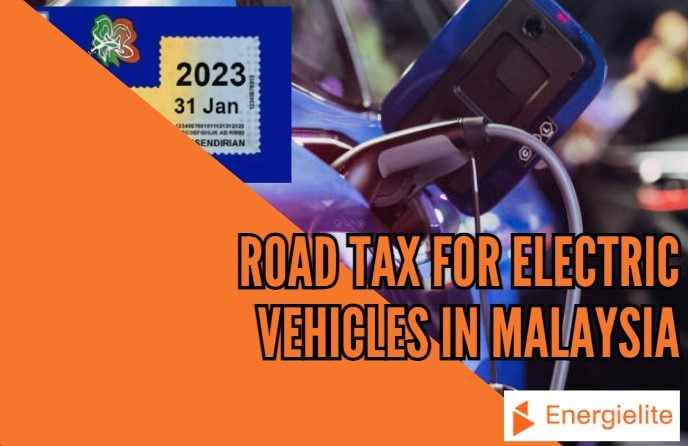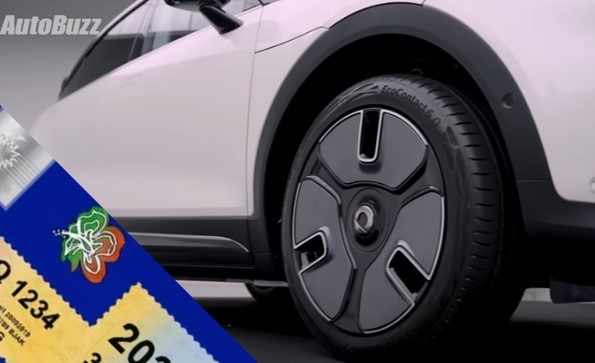
Overview
In the realm of vehicle ownership, a substantial financial outlay is associated with the periodic renewal of road tax, encompassing various costs, including insurance premiums. Within the Malaysian context, electric vehicles (EVs) incur notably elevated road tax charges in comparison to conventional vehicles such as the Myvi.
This notable disparity in road tax arises due to the inherent absence of a traditional internal combustion engine in EVs, prompting the adoption of an alternative road tax calculation methodology, rooted in the vehicle’s motor kilowatt (kW) output, thereby serving as a quantification of the car’s power.
Road Tax Calculation Based on Motor Kilowatt Output

The determination of road tax for privately-owned “saloon” vehicles, including sedan, hatchback, coupe, wagon, and convertible models, relies on a predefined set of fixed rates as follow:
| Kilowatt Output | Road Tax Rates |
|---|---|
| Under 50kW | RM20 |
| 50kW – 60kW | RM44 |
| 60kW – 70kW | RM56 |
| 70kW – 80kW | RM72 |
For vehicles with power outputs under 80 kW, road tax is straightforward. But for those exceeding 80 kW, a progressive rate is applied, calculated per 0.05 kW increase.
| Kilowatt Output | Base Rate | Progressive Rate |
|---|---|---|
| 80kW – 90kW | RM160 | RM0.32 |
| 90kW – 100kW | RM224 | RM0.25 |
| 100kW – 125kW | RM274 | RM0.50 |
| 125kW – 150kW | RM524 | RM1.00 |
| Over 150kW | RM1,024 | RM1.35 |
To exemplify the road tax computation, let’s take the case of a Nissan Leaf, boasting a power output of 110kW. This situates the vehicle within the 100kW – 125kW road tax category.
The initial 100kW incurs the established base fee of RM274, while the extra 10kW is subject to a progressive rate, calculated as RM0.50 multiplied by 200, resulting in an additional RM100. Consequently, the cumulative road tax for the Nissan Leaf amounts to RM374.
Is EV Road Tax Cheaper Than that of Combustion Engine Cars in Malaysia?

For a comparative analysis, let’s equate kilowatt figures to horsepower values. Take, for instance, the Nissan Leaf, with a horsepower rating of 147 hp, incurring a road tax of RM374.
Contrasting this with internal combustion engine vehicles featuring similar horsepower, the Proton X50 (150 hp) is subject to a road tax of RM120, while the Audi A3 (150 hp) carries a road tax of RM70.
When considering the power output in terms of horsepower, it becomes evident that road tax for electric vehicles (EVs) appears to be more costly compared to their combustion engine counterparts.
Nevertheless, it’s crucial to keep in mind that EVs stand to benefit from a road tax exemption from 2022 to 2025, courtesy of recent budgetary incentives. The government has introduced a range of tax-free incentives for EVs, including the waiver of road tax. This presents a favorable window of opportunity to embrace the electric vehicle revolution.
Conclusion
In Malaysia, road tax for electric vehicles (EVs) is determined by their motor kilowatt (kW) output, making it potentially more expensive than combustion engine cars with similar horsepower.
However, recent tax incentives have exempted EVs from road tax between 2022 and 2025, encouraging the adoption of EVs in the country. This demonstrates the government’s commitment to promoting sustainable transportation options.
Frequently Asked Questions
What are the current road tax rates for electric vehicles in Malaysia?
The current road tax rates for electric vehicles in Malaysia depend on the output of the vehicle. For private and company-owned saloon EVs with an output of 80 kW and below, the fixed rates are as follows:
| Output | Rate |
|---|---|
| <50 kW | RM20 |
| 50 kW to 60 kW | RM44 |
| 60 kW to 70 kW | RM56 |
| 70 kW to 80 kW | RM72 |
For vehicles with an output above 80 kW, a progressive rate is applied to determine the road tax.
Are there any tax incentives for owning an electric vehicle in Malaysia?
Yes, there are tax incentives for owning an electric vehicle in Malaysia. The government provides a full exemption on import and excise duties for electric vehicles until the end of 2025. Additionally, the government provides a 50% exemption on the sales tax for electric vehicles until the end of 2023.
How does the road tax for electric vehicles compare to traditional gasoline vehicles?
The road tax for electric vehicles is generally lower than that of traditional gasoline vehicles. This is because electric vehicles have lower emissions, which means they are subject to lower taxes. Additionally, the government provides tax incentives for electric vehicles, which further reduces the cost of ownership.
What is the process for paying road tax on an electric vehicle in Malaysia?
The process for paying road tax on an electric vehicle in Malaysia is the same as that for traditional gasoline vehicles. Vehicle owners can pay their road tax online or at any post office or JPJ branch.
Do electric vehicles need to undergo emissions testing for road tax purposes in Malaysia?
No, electric vehicles do not need to undergo emissions testing for road tax purposes in Malaysia. This is because electric vehicles do not emit any pollutants, which means they are exempt from emissions testing.
Are there any plans to reduce the road tax for electric vehicles in Malaysia in the near future?
There are currently no plans to reduce the road tax for electric vehicles in Malaysia in the near future. However, the government is committed to promoting the use of electric vehicles and may introduce further incentives in the future.




